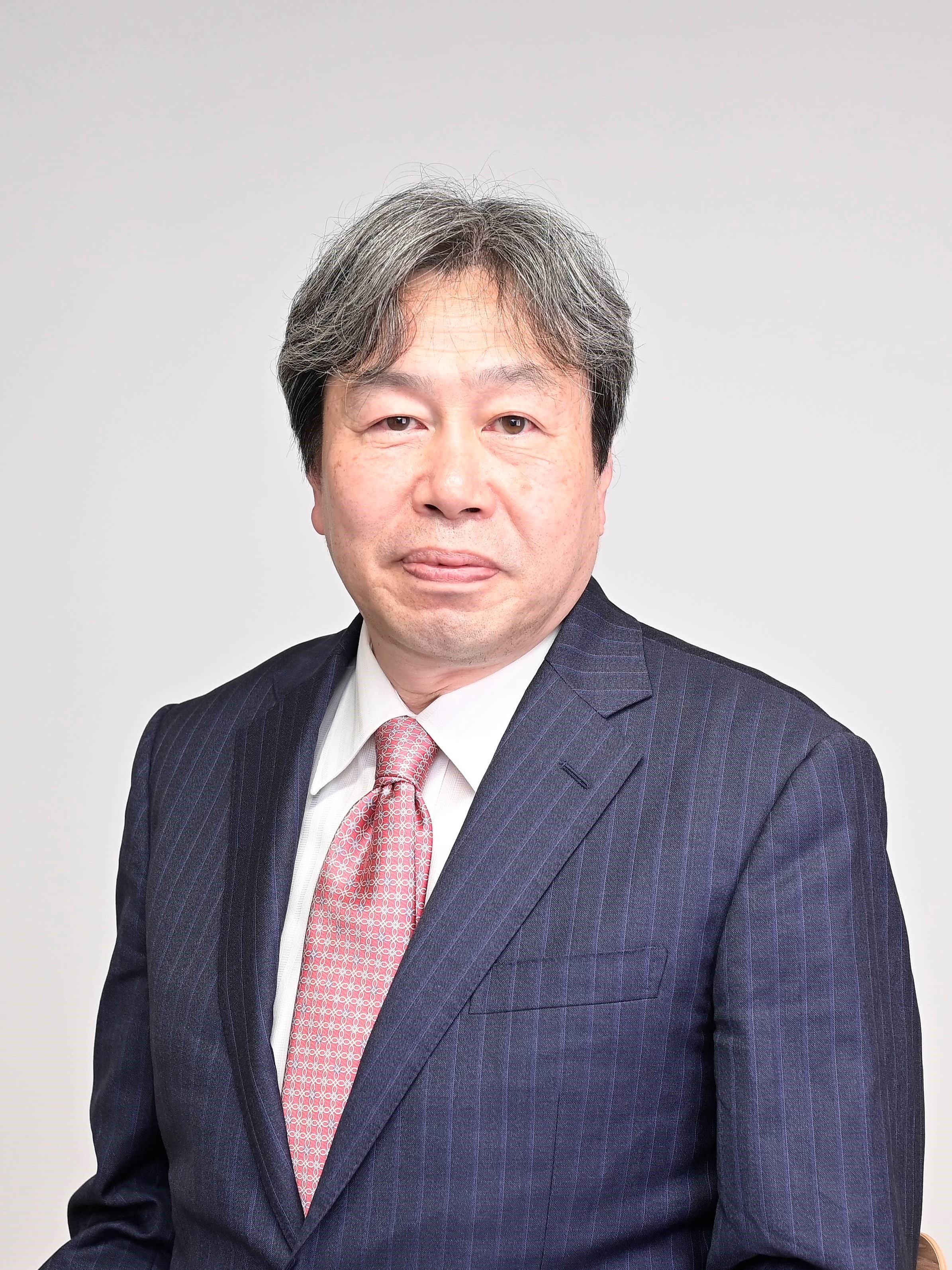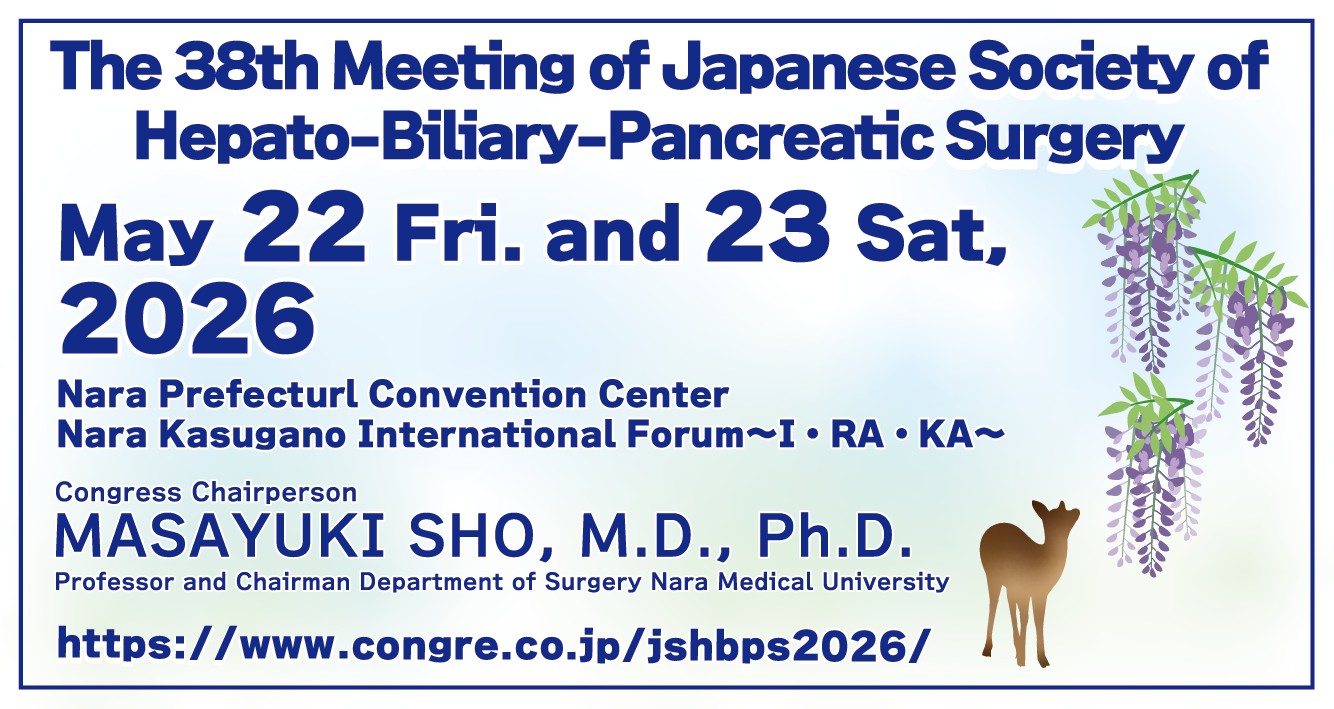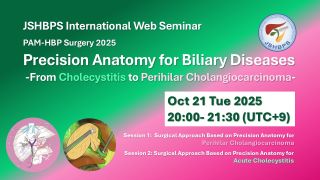
Masayuki Otsuka
President
Japanese Society of Hepato-Biliary-Pancreatic Surgery
I was appointed as the 7th Representative Director (President), successor to Dr. Itaru Endo, at the meeting of the Board of Directors held for the 36th Meeting of Japanese Society of Hepato-Biliary-Pancreatic Surgery (JSHBPS) in Hiroshima. The former body of JSHBPS was inaugurated as the Japan Hepato-Biliary-Pancreatic Forum, and then reorganized as the Japanese Society of Hepato-Biliary-Pancreatic Surgery in 1993. Thereafter, it became incorporated in 2011, and is now the present JSHBPS. JSHBPS has grown dramatically through the great efforts of our predecessors since, literally, the dawn of hepato-biliary-pancreatic surgery in Japan. Currently (as of March 31, 2024), JSHBPS has 3,512 members, leading hepato-biliary-pancreatic surgery in Japan and around the world, both in name and reality. It is great honor for me to be promoted as the President of the Society with its long-established history and tradition, and at the same time, I am truly humbled to assume this very responsible position.
Our philosophy and targets of activities, as described by Dr. Tadahiro Takada, Founding President of JSHBPS, are: 1. Art; 2. Science; 3. Publication of the Journal of Hepato-Biliary-Pancreatic Surgery; 4. Establishment of a board certification system for expert surgeons; and 5. Internationalization. As great missions of JSHBPS among them, I would like to adopt the following 6 target activities.
- Fostering of surgeons who are able to perform high-level hepato-biliary-pancreatic surgery safely and reliably and conduct perioperative management
The establishment of a board certification system for expert surgeons was announced in 2004, and the board certification system was inaugurated in 2008 for the purpose of “cultivation of surgeons who are capable of performing safe and reliable, high-level advanced surgery in the HBP field”. By the end of 2023, the number of board-certified expert surgeons and board-certified instructors have reached 587 and 447, respectively, and the number of training facilities A and B for highly skilled expert surgeons have reached 139 and 303, where certified surgeons and instructors are deployed across Japan. These training facilities are mandated to report operative mortality rates to JSHBPS every year. As a result, the operative mortality decreased year by year, and the 90-day mortality has decreased to less than 1%, an excellent achievement we can boast to the world. From now on, we direct our attention to perioperative management as well, with utmost importance given to the public interest of being patient-first, and commit ourselves to fostering hepato-biliary-pancreatic surgeons who are able to perform surgery safely and reliably and conduct perioperative management. We hope that we will make our achievements known to the world.
- Development of the Journal of Hepato-Biliary-Pancreatic Science (JHBPS)
JHBPS was first published in 1993, aiming to “deliver scientific evidence originating in Japan to the world.” The impact factor of the journal was less than 2.0 points at the time of registration but by 2023 had improved to 3.2 points. However, there are of course surgery journals with a higher impact factor, and many contributors tend to focus on those journals. We feel it is necessary to make further efforts to make JHBPS become the world’s first-class journal in line with the initial goal to “deliver scientific evidence originating in Japan to the world.” We would like all of our members to remind themselves that JHBPS is the official journal of JSHBPS and have a sense of ownership, thinking “let’s all grow this together.”
- Reinforcement and expansion of the project research structure
In recent years, Japan’s decreased research and communication ability has been pointed out. Highly cited articles in JHBPS are generally found to have originated from outside Japan. Since it becomes difficult for a single center in Japan to conduct research with high evidence level due to small sample size, we consider it important to conduct society-initiated project research in order to enhance the international presence of Japan. We will promote research using data from biliary tract cancer registration, topic-specific research at academic conferences, and research initiated by young scientists, including creation of guidelines. In addition, we have constructed the Liver Metastasis of Colorectal Cancer Database in cooperation with the Japanese Society for Cancer of the Colon and Rectum and make it available for clinicians and researchers.
- Further promotion of internationalization
Internationalization is one of the founding philosophies of our Society. JSHBPS also acts as Japan Chapter of the International Hepato-Pancreato-Biliary Association (IHPBA). We will make efforts to further deepen exchanges with IHPBA, Asia Pacific Hepato-Pancreato-Biliary Association (A-PHPBA), and other organizations, present excellent research achievements of Japanese surgeons at international academic conferences, and enhance our presence. We also ask JSHBPS members to participate in Japan HPB passport membership. Japan is an Asian country. We will also commit ourselves to outreach to developing countries in Asia and enhance our presence. We will consider creating a system that can support our commitment.
- Attractive academic meetings
Under the philosophy of internationalization, all our academic meetings have been conducted only in English since 2017. There are pros and cons as to whether it is appropriate to use only English at meetings, but the essence of academic meetings is a place for important academic activities. We consider that whether we can hold high-quality discussions does not always depend on making English the only language available for use. It is not easy to achieve both internationalization and high-quality discussion, but we will continue our efforts to go forward in a better direction through repeated discussions. I will dedicate myself, together with Chairperson of Academic Conference, to aiming for attractive academic conferences that all members want to attend.
- Promotion of active performance and diversity of young hepato-biliary-pancreatic surgeons
Active performance of young surgeons makes our Society active. The Next Generation Project (NGP) was launched by Dr. Itaru Endo, the former President, with Dr. Ken Shirabe, the former Vice President, as advisor, where members aged 45 years or younger are taking the initiative in the NGP activities, aiming for “a bright future of hepato-biliary-pancreatic surgery.” Fostering young surgeons who can play a role in the development of hepato-biliary-pancreatic surgery in Japan and the world is an important challenge. We will provide a platform where young surgeons can perform at their full potential and promote their participation in the NGP activities. Today, the promotion of diversity is required in all social activities. We will continue our efforts to create an environment where hepato-biliary-pancreatic surgeons with diverse backgrounds, whether male or female, can perform at their full potential, and will actively promote their participation in the management of our Society.
I have mentioned our challenges and achievements, but all of them are based on great achievements thus far built up by the presidents, directors, councilors, and members of the Society from generation to generation. I will give importance to transparency and fairness in the management of our Society and do my utmost, in cooperation with directors and members, to make JSHBPS a more mature and sustainable academic society and contribute to the public at large and especially patients. Thank you very much for your continued support and guidance.
July 7, 2024




